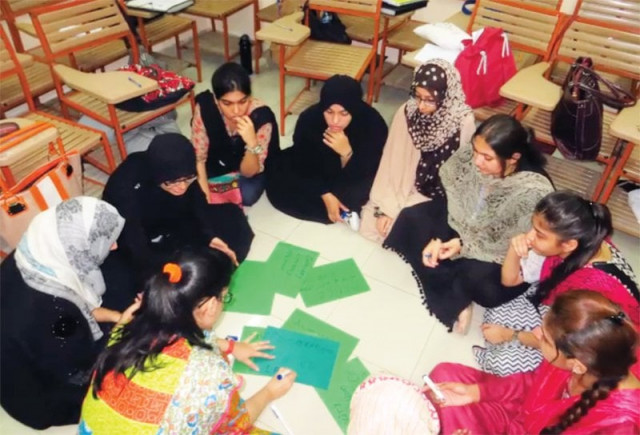Mobilising youth for community uplift as a sustainable investment
Active Citizens Programme promotes community cohesion and improvement through civic engagement.

There is now a growing global trend in increased volunteer youth mobilisation to help create inclusive and sustainable cities. PHOTOS: FARHAN ANWAR
Concerns on balancing needs for social equity, ecological integrity and economic vitality, and for creating liveable communities for today and tomorrow brought together a diverse set of community members to define and research ‘indicators’ of a ‘sustainable community’ and to measure progress. The project was honoured with an ‘Excellence in Indicators’ award from the United Nations Centre for Human Settlements at the 1996 Habitat II conference.

There is now a growing global trend in increased volunteer youth mobilisation to help create inclusive and sustainable cities. PHOTOS: FARHAN ANWAR
The project has since evolved with an increased focus on community mobilisation that is facilitated by youth engagement. The project team feels that actively engaging youth in community service at an early age builds the foundation for the making of positive contributions to their community’s civic and social life long-term. The youth also experience a sense of place in the community. There is now a growing global trend in increased volunteer youth mobilisation to help create inclusive and sustainable cities.
It is encouraging to note that in Pakistan — both at civil society and government level — there is now an increased effort for mobilising youth for community engagement. In this regard, a globally-based non-profit programme run by the British Council with local partner organisations, the Active Citizens Programme, with the motto ‘globally connected: locally engaged’ has provided a good platform for youth capacity building and community engagement in Pakistan. The programme promotes community cohesion and improvement through civic engagement and volunteer work.
One of its success stories has been the partnership it has forged with the ‘Institute of Professional Psychology’ (IPP), Bahria University, Karachi. The initiative began last year with the training of relevant faculty at the Lahore College for Women University and has since then evolved into a multi-faceted and innovative partnership with a number of successfully completed student-community linkage projects.
According to IPP senior lecturer and the focal person for the Active Citizens Programme-IPP partnership, Dr Kiran Bashir Ahmad, in every semester, as a part of the programme, five modules are implemented where the whole class participates either in the form of a group or in an individual capacity. The students are given the freedom to define their own programme objectives as the development of critical thinking and self-mobilisation for positive reforms and the removal of the ‘dependency factor’ mindset is a critical ingredient of the programme. The students thus in a way become ‘entrepreneurs’ and this thinking, once inculcated in the students, is then transferred to the communities they engage with.
Various concepts of the ‘positive psychology’ theme that stand for the spreading of positivity in the society have been incorporated in the programme to develop and implement multiple ‘Positive Social Action Projects’.
Dr Ahmad said that in one such project, students aimed to bring psychology and society together on one platform. The locality of Azam Basti was selected and the students conducted a mural painting activity with the children and adults residing in the area. It was felt that in today’s Pakistan, circumstances have led to low levels of hope and optimism and the activity was developed with the aim that it will improve the mood.
Similarly, the ‘Shama’ project was also conducted to raise awareness and education levels on household hygiene. The main focus was on the women of the house as they are the ones primarily responsible for maintaining household hygiene and it was felt that they would be the ones most helpful in further spreading the message. The project was conducted in the city slums and areas inhabited by the marginalised communities. Other projects include inculcating self-sufficiency in functionally disabled patients and running anti-smoking and animal rights campaigns.
Farhan Anwar is an urban planner and runs a non-profit organisation based in Karachi focusing on urban sustainability issues
Published in The Express Tribune, June 23rd, 2014.



















COMMENTS
Comments are moderated and generally will be posted if they are on-topic and not abusive.
For more information, please see our Comments FAQ